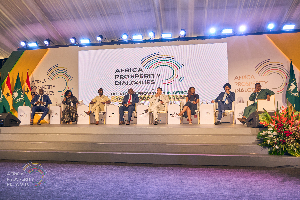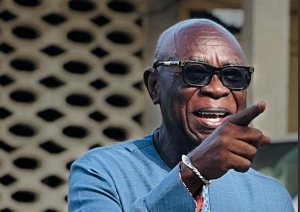An estimated $2.3billion worth of gold left the shores of Ghana through illicit small-scale mining (galamsey) in 2016, Minister of Lands and Natural Resources, John Peter Amewu has revealed.
“As I speak today, in the year 2016, $2.3billion worth of gold left this country through illicit mining,” Mr Amewu told journalists on Monday, 27 March.
He said his ministry is putting together a team to investigate the trend and curb it by strangulating the thriving galamsey situation in the country.
Mr Amewu said there is now the “political will” to fight galamsey following the election of Nana Akufo-Addo into office as President. According to him, the “militant approach” used in the past has not solved the problem.
In February 2016, CEO of the state-owned Precious Minerals Marketing Company (PMMC), George Abradu-Otu expressed concerns about the quantum of gold revenue Ghana loses through illicit gold mining activities even though the country is the second-largest gold producer in Africa and the eighth in the world.
He told Ekow Mensah-Shalders on Class91.3FM’s Executive Breakfast Show on Wednesday, 24 February that the impoverished and underdeveloped nature of mining cities in Ghana such as Obuasi, Tarkwa, Prestea, and Dunkwa, underscored his assertion that the country had not benefited from the commodity.
According to him, the situation is different in Johannesburg and Pretoria, which are also mining cities in South Africa – the world’s largest gold mining country – where the benefits of the commodity can be seen and felt.
“Ghana is the second-largest gold producer in Africa after South Africa, we’re the 8th in the world, [but] what do we have to show for it? If you ask me whether gold has benefitted Ghana, I’ll say no,” Mr Abradu-Otu emphasised.
He put the situation down to smuggling, under-invoicing, under-declaration and corruption, within the gold mining and exporting sector. He said there were a lot of syndicates which were circumventing laid-down procedures through corrupt means, in exporting gold, thus, robbing the country of foreign exchange.
Mr Abradu-Otu also told Accra100.5FM’s breakfast show Ghana Yensom hosted by Chief Jerry Forson a day earlier that Ghana loses a lot of revenue to gold smuggling.
According to him, Ghana has been losing an average of $1.925 million per annum from the smuggling of gold to India for the past few years.
The PMMC CEO made his comments following the impoundment by the Customs Division of the Ghana Revenue Authority (GRA), of 12 boxes which contained gold bullion that weighed about 480kg at the Kotoka International Airport. The bullion was valued at US$18million.
It belonged to two Indian firms and three Ghanaian companies, and was bound for Asia and the Middle East – particularly India and Dubai.
The PMMC official said most of the gold from Ghana ended up in India, where the precious mineral is an essential part of Indian culture.
Mr Abradu-Otu debunked assertions that the PMMC was not competitive, saying Ghanaian gold dealers were rather actively aiding foreigners trading in gold from registering with the company to be licensed to do business in the country.
He said some customs and airport officials were often bribed so the smugglers get a leeway to take their gold outside the country without appropriate documentation.
He also said other foreign gold dealers who had been aided by the PMMC to export their gold with the understanding that they would repatriate the revenue back into the country had failed to do so, leading to pressure on the local currency.
According to figures from the Bank of Ghana, in 2015 a total of $3.2 billion worth of gold was exported from Ghana by both large and small-scale miners.
Business News of Tuesday, 28 March 2017
Source: classfmonline.com
$2.3bn lost to galamsey in 2016
Entertainment
















